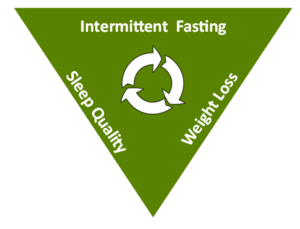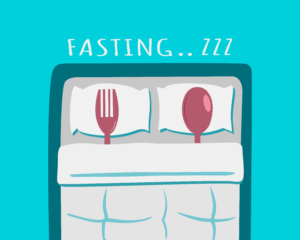Intermittent fasting and sleep are two miraculous ways to repair and rejuvenate your body. Learn how to combine the two for a great night’s sleep!
You are a marvel of biomechanical engineering
The human body with its interconnected systems is the most advanced structure in the known universe. It is truly a marvel of biomechanical engineering! (The Miracle of the Human Body) For instance, our brains can hold five times as much information as the Encyclopedia Britannica. And our hearts pump blood through 60,000 miles of veins and capillaries. Every square inch of our skin includes four yards of nerve fibers. Plus, our eyes can take in more information than the largest existing telescope. And your lungs have a surface area the size of a tennis court! (All Pro Dad)
Intermittent fasting and sleep
We could talk for days about our miraculous bodies, but today we’re going to focus on the intermittent fasting and sleep functions. Because these two systems quietly do all kinds of daily repairs to the body as well as preventing future illness.
My favorite part? Both intermittent fasting and sleep require NO work or movement while you’re doing them. In fact, quite the opposite! However, both intermittent fasting and sleep need to be a regular priority to enjoy the many benefits they can provide.
But before we dive in to talking about intermittent fasting and sleep, we are briefly going to talk about how weight loss fits into the equation.
Understanding the cycle of intermittent fasting, weight loss and sleep
Over the past few years, intermittent fasting has emerged as one of the most popular ways to lose weight. Unlike other eating plans, intermittent fasting doesn’t dictate what you eat. It just recommends when you eat.

{RELATED POST: Signs Intermittent Fasting Is Working}
Weight loss improves sleep
Interestingly, accumulating evidence suggests that weight loss may improve sleep. In a recent weight loss trial, successful weight loss maintainers reported better sleep quality and longer sleep durations. (National Library of Medicine)
Sleep makes intermittent fasting easier
So how how does better sleep quality complete the circuit? Because according to Healthline, overtiredness can trigger the hormone ghrelin. This hormone spikes food cravings and the feeling of hunger. The last thing you want while fasting is unnecessary thoughts of food.
Things to remember about weight loss
Now I know for many of us, our reasons for losing weight have nothing to do with sleep quality. Usually, we want to lose weight so we can improve our appearance. For others, it’s more about improving our health. Which is appropriate, because being overweight is linked to the leading causes of death world wide. (Frontiers in Psychology)
{RELATED POST: Reasons to Lose Weight}
Make sure weight loss means fat loss
When we talk about weight loss, it’s important to remember that it’s actually fat loss we are pursuing. Because while fat loss always equals weight loss, weight loss doesn’t always equate to fat loss. We don’t want to reduce our weight by losing muscle mass, bone mass, water weight, etc.
So it’s imperative that you regularly confirm your weight loss is actually fat loss. I shudder to think about all the times my body was eating muscle and I was celebrating weight loss.
To make sure you are losing fat, you’ll want to get an inexpensive smart scale and smart measuring tape. I recommend the Arboleaf smart scale and smart measuring tape. Both the scale and the tape upload your weight metrics and body measurements to the same free app. That makes it easy to track your progress and figure out what is working.

Both are very easy to use
Simply step on the scale and consult the free app to make sure you’re losing fat instead of muscle, bone, etc. The measuring tape is super easy too! No bending and contorting, and no need to ask someone for help. It guides you through taking your measurements and displays your results by date. It’s super simple, enlightening and very motivating.
Okay, so we’ve established how to optimize your weight loss. So now let’s get started and discover together how intermittent fasting and sleep are your body’s repair and anti-aging weapons!
Women Who Fast is a participant in the Amazon Services LLC Associate Program, which means we receive a commission if you purchase through our link, at no extra cost to you.
What is intermittent fasting?
To put it simply, intermittent fasting refers to establishing periods of time to consume zero calories on a regular basis. (I do want to note, that some experts believe you can consume some calories, but that is not the majority opinion.) So, how does this work?
“When your body goes into a fasting mode, your digestive system quiets. Your body uses this time to repair and restore itself at a cellular level. Fasting also triggers the body to use its stored fat for energy, making it an effective strategy for weight loss.” (Psychology Today)
Experts agree that intermittent fasting is not for everyone. Please read our Terms of Use.
Our ancient ancestors practiced intermittent fasting
Before modern technology (like refrigerators and freezers), intermittent fasting was a way of life. Our ancestors ate when food was available and fasted when it wasn’t.
I know many of us despise the way our body holds on to weight, but for those before us? It’s the reason they were able to live through the long cold winter. I have seen a modern day version of this with my tiny, elderly mom. Her doctor encourages her to carry ten extra pounds “just in case” she would become ill and lose her appetite.
Long before people started intermittent fasting to lose weight, they were actually doing it for better health. For instance, you may know Hippocrates was a great philosopher from a long time ago. (Fifth century BC to be exact.) But did you know he was also a Greek physician?
In fact, many consider Hippocrates to be the father of modern medicine. And here’s what he told his sick patients; “To eat when you are sick, is to feed your illness.” Plutarch, another ancient Greek writer wrote “instead of using medicine, better fast today.” Additionally, Benjamin Franklin wrote in the 1700’s “the best of all medicines is resting and fasting.” (NIH).
As impressive as this list is, these are just a few historical fasting proponents. And we actually can go even further back in time as most world religions contain fasting in their teachings as well.
Compelling benefits of intermittent fasting
The modern-day buzz about intermittent fasting is primarily focused on weight loss. (To be more specific, fat loss as we discussed above.) However, weight loss is just one of the many perks of intermittent fasting. In fact, a case could be made that it isn’t even the most impressive benefit.
I have a google alert set up on my phone for “intermittent fasting.” And every day there is something new. Here’s a passage in Psychology Today that sums it up quite nicely:
“Research shows that fasting can result in weight loss. Research also shows fasting can improve insulin sensitivity, lower inflammation, and improve markers for heart disease including lowering levels of unhealthy LDL cholesterol. Intermittent fasting has also shown promise in offering protection against and treating some cancers, as well as neurodegenerative diseases such as Alzheimer’s and Parkinson’s.
Studies show intermittent fasting strengthens immune function and enhances the body’s ability to repair cells and natural production of human growth hormone appears to rise dramatically in connection with intermittent fasting.
Human growth hormone encourages burning of fat and maintenance of lean muscle mass, aids in cellular repair, and may help slow the aging process. And fasting can reduce unhealthful inflammation and boost the body’s ability to protect itself against oxidative stress which is a major contributor to aging and disease.”
Our bodies come pre-loaded with a healing system!
Isn’t it amazing that our incredible bodies come pre-loaded with a healing system on board? Perhaps equally startling is that many of us (including myself) live most of our lives without even knowing about it.
This quote from Dr. Adam Collins to the BBC really caught my attention. “All the things we associate with poor metabolic health and disease risk–cardiovascular disease, insulin resistance, diabetes and low energy–are essentially a manifestation of fuel mismanagement. Eating in a a grazing pattern means you’re not able to store, liberate and utilize fuel in the right way.”
Please remember, I am not a doctor or a scientist so I can’t give you any medical advice nor would I ever want to. Whenever I present any scientific information, I always provide you with a link to the same information I’m reading for my own purposes for you to consider. Obviously, nothing you read here should ever be a substitute for medical advice from a health professional. 🙂
Intermittent fasting’s double feature
There are two key functions of intermittent fasting that I definitely want to highlight because they are the magic-makers!
1. Metabolic Switching (this is where the fat loss comes in)
 The articles continues: “In a ‘fasted’ state, which typically starts 10-12 hours after your last meal, the body is depleted of this form of glucose. Then the liver begins to break down stored fat into fatty acids called ketones to use as fuel. This process is know as ‘metabolic switching‘ and is a reason why fasting can lead to weight loss.”
The articles continues: “In a ‘fasted’ state, which typically starts 10-12 hours after your last meal, the body is depleted of this form of glucose. Then the liver begins to break down stored fat into fatty acids called ketones to use as fuel. This process is know as ‘metabolic switching‘ and is a reason why fasting can lead to weight loss.” 2. Autophagy (your body’s built-in recycling system)
Earlier in this post, we discussed several historic philosophers and leaders who suggested intermittent fasting for health benefits. In addition, we know that world religions have been practicing it since the beginning of time. Was that ancient instruction purely based on observation? Primitive science? Divine knowledge? We don’t know for sure.
But, we do know that on October 3, 2016 the Nobel Prize in Physiology/Medicine was awarded to Yoshinori Ohsumi for “discoveries of the mechanisms for autophagy.” Nobel prizes reward significant discoveries; so what is autophagy?
How autophagy cleans and repairs your body
The word “autophagy” is derived from the Greek and means “to eat” (phagy) “oneself” (auto). “Autophagy is an essential process that takes place in the human body with the goal of removing dysfunctional and unwanted parts of cells as well as regenerating existing cells to make them newer and healthier. So autophagy represents a self-preservation mechanism through which humans can clean and repair their body.” (Frontiers in Psychology)
This BBC article provides more detail. “Autophagy is the process by which the body starts to recycle the structures insides its cells, including the nucleus, where DNA is stored. The mitochondria, which synthesizes the chemical our cells use for energy, and lysosomes, which remove waste from our cells. In doing so, the cell can remove defunct structures, freeing up new raw materials from which new cellular structures can be built. Some of the new raw material might be used to make cell-protective proteins that further extend the lifespan of cells.”
It’s exciting to me that the scientific study of autophagy is still in early stages. Hopefully in the coming years, autophagy will be known treatments for some of the most debilitating diseases we are currently fighting. I’ve already experienced some of the anti-aging benefits and to be honest, I was a hard-sell. But I’m completely convinced now.
How to start intermittent fasting?
Does sleep count as fasting?
Sleep: The body’s facelift
We all know exactly what it means when someone says “you look tired” Because we saw it ourselves in the mirror earlier that day. No matter how we applied our make up, the dark circles are still there. We know our face is a different hue than usual and our skin doesn’t quite look like it fits. It’s never a compliment.
Not all of us are familiar with intermittent fasting. But “sleeping” is something every single human experiences on hopefully a daily basis. Our bodies need at least minimal sleep to keep going. But quality sleep can take things to a completely different level.
According to NBC news, sleeping plays a chief role in giving us a healthy appearance. And we already know that right? Because in the mornings when we look borderline sickly, it’s usually because we didn’t get a good night’s sleep. Dr. Jeffrey Durmer of Fusion Health explains: “The face is highly vascularized. When you become sleep deprived the nervous system starts to not regulate the blood vessels very well, often resulting in redness across the face and neck. The darks circles under the eyes are a result of inflammation. The tired pallor is owed to the disruption in blood flow distribution that occurs during sleep.”
Perhaps that’s why a Sealy in the UK found that well-rested people reported having brighter eyes, a brighter complexion, clearer skin, fewer wrinkles, and improved skin condition.
Sleep holds the key to the fountain of youth
Actually, prolonged sleep-deprivation can affect our looks from head to toe. According to Dr. Mikhail Varshavski, “Sleep is a regenerative process where we heal and where our neurons build strong connections. It’s like a fountain of youth that you dive into every night.
However, this fountain of youth phenomenon cannot happen while awake so sleep is necessary. According to Dr. Jeffrey Durmer of Fusion Health: “When you sleep you’re going through choregraphed cycles of REM and non-REM that can’t happen when you’re awake.” Dr. Durmer explains that it’s largely during non-REM sleep (4-8 hours), usually in the early onset of deep sleep, that the repairing process occurs.
“Poor sleep results in premature aging. This is because there are three key times that our body releases growth hormone,” says Dr. Jacob Teitelbaum, an internist and author of “From Fatigued to Fantastic.“ We talked about earlier about how the natural production of Human Growth hormones rises dramatically when you’re intermittent fasting. Sleep is one of the times that Human Growth hormone is naturally produced.
Human Growth hormone is your anti-aging friend
So when you are fasting and sleeping at the same time? The sleep naturally produces the hormone and the fasting increases it. So next time you go to bed hungry due to intermittent fasting? Remind yourself that you are optimizing your human growth hormone production. According to Dr. Teitelbaum, the human growth hormone keeps us young. It keeps our muscled toned and our skin at full thickness.
How to optimize sleep and intermittent fasting
1. Don’t go to bed too hungry
If you are having trouble getting to sleep because you’re hungry, aim to have your last meal three hours before bed. That way your digestion won’t disturb your sleep, but you won’t be starving. In addition, avoid junk food during that last meal of the day. If you stick to nutrient-rich foods, you will stay full longer.
2. Stay hydrated especially when you’re fasting
Going to bed dehydrated can lead to shorter, low-quality sleep. Drink lots of water during the day and take a tall glass to bed with you. Drinking water may reduce your hunger cravings and allow you to fall asleep.
3. Avoid caffeine and alcohol if you can’t sleep
If you’re having trouble falling asleep, try decreasing your caffeine and/or alcohol. Both disrupt your sleep and can negatively impact your metabolism.
4. Don’t give up
Too many people throw in the towel on intermittent fasting because they don’t like to feel hungry. Especially when they are trying to get to sleep. Stay with it and keep experimenting with that last meal to optimize your sleep.
Remind yourself that intermittent fasting and sleep work together
Intermittent fasting allows your body to repair itself through autophagy. Plus, intermittent fasting also helps you lose weight. And even a small weight loss can improve your sleep quality.

I hope this post about intermittent fasting and sleep has given you some ideas about how to improve your health and and slow down the aging process. All the best to you!
Intermittent Fasting has changed my life and it can yours too! Track your progress and keep us with us daily by downloading the Women Who Fast App from the App store or Google Play!
Sources
- The Miracle of the Human Body, Described and Captioned Media Program
- 10 Miraculous Things About Your Body, All Pro Dad
- Mara McStay, Kelsey Gabel, Sofia Cienfuegos, Mark Ezpeleta, Shuhao Lin, Krista A. Varady, Intermittent Fasting and Sleep: A Review of Human Trials, National Library of Medicine, October 1, 2021
- Natalie Silver, Should You Go to Bed Hungry? Healthline, September 24, 2020
- Michael J. Breus Ph. D., What Is Intermittent Fasting and Will It Help Your Sleep, Psychology Today, April 11, 2019
- Izzah Vasim, Chaudry N. Majeed, Mark D. DeBoer, Intermittent Fasting and Metabolic Health, National Library of Medicine, February 14, 2022
- Sue Quinn, Could Leaving 12 Hours Between Dinner and Breakfast Benefit Health?, BBC Food
- Sicheng Min, Bojan Masanovic, Te Bu, Radenko M. Matic, Ivan Vasiljevic, Marina Bukotic, Jiaomu, Jovan Vuvovic, Tao Fu, Blazo Jaucanin, Raijko Bujovic, Stevo Popovic, The Association Between Regular Physical Exercise, Sleep Patterns, Fasting, and Autophagy for Healthy Longevity and Well-Being, Frontiers in Psychology, December 2, 2021
- William Park, The Benefits of Intermittent Fasting the Right Way, BBC Future, January 11, 2022
- Why Beauty Sleep is real, According to Doctors, Better By Today,/NBC News, July 30, 2018 {Dr. Mikhail Varshavski, Osteopathic Doctor; Dr. Jeffrey Durmer, Neurologist, Systems Neuroscientist, Sleep Medicine Physician, Chief Medical Officer of Fusion Health; Dr. Jacob Teitelbaum, Internist specializing in Chronic Fatigue Syndrome, Fibromyalgia, and Pain Management}
- Jay Summer, Why Intermittent Fasting Can Lead to Better Sleep, Sleep Foundation, June 24, 2022

















